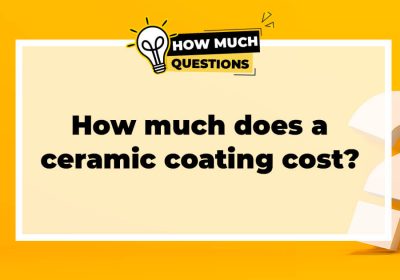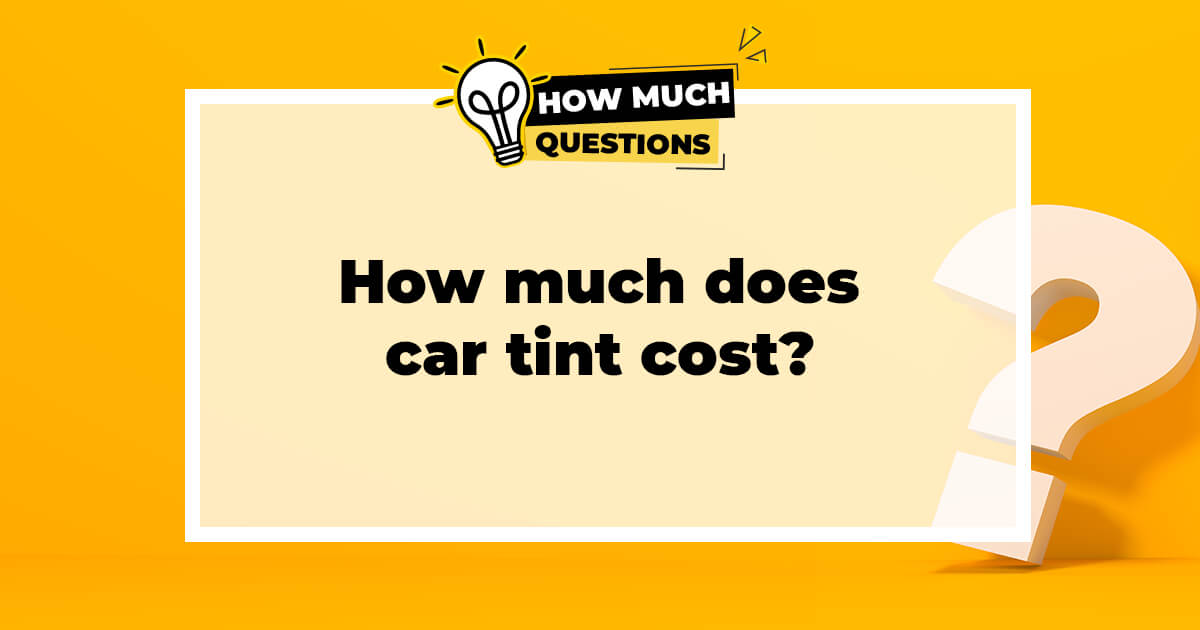
How much does car tint cost?
Discover the factors that influence car tint costs and savvy tips for saving money. Get expert guidance for optimal choices.

Introduction
When it comes to car tinting, one burning question often lingers: "How much does car tint cost?" The answer isn't straightforward, as several factors come into play. In this article, we'll delve into the key factors influencing car tinting costs, provide pre-purchase considerations to keep in mind, share cost-saving tips, and offer guidance for making optimal choices.
How Much Does Car Tint Cost?
Car window tinting prices can vary based on several factors:
- Type of Tint: Basic dyed tinting can start as low as $50-$100 for the entire vehicle, while high-quality ceramic tints can go up to $500-$800.
- Vehicle Size: Larger vehicles like SUVs and trucks might cost more than sedans due to the increased surface area.
- Labor: Depending on the installer's expertise and location, labor costs can range from $100-$400.
- Additional Services: Some providers might offer UV protection, heat reduction, or increased privacy features at an added cost.
On average, most car owners can expect to pay between $100 and $400 for professional window tinting. However, it's essential to get quotes from multiple providers and read reviews to ensure quality work.
Factors Influencing Cost
1. Type of Tint Film
The type of tint film you choose significantly impacts the cost. Basic dyed film is budget-friendly, while high-performance ceramic or carbon films come at a premium. Discussing the pros and cons of each will help you make an informed decision.
2. Window Size and Quantity
The size and number of windows to be tinted affect the overall cost. Larger vehicles with more windows will naturally incur higher expenses. We'll provide insights into how to manage costs based on your vehicle's specific needs.
3. Tinting Brand and Quality
Not all tinting brands are equal in quality. We'll discuss reputable brands and emphasize the importance of investing in quality to ensure longevity and effectiveness.
4. Legal Regulations
Different regions have varying regulations regarding window tint darkness and reflectivity. Violating these regulations can lead to fines and additional costs. We'll guide you on staying compliant.
5. Tint Installation
Professional installation guarantees a flawless finish but comes with a cost. DIY options are cheaper but require skill and may not offer the same quality. We'll help you weigh the pros and cons.
Pre-Purchase Considerations
1. Legal Compliance
Before getting your car tinted, research local laws to ensure your chosen tint meets legal requirements. Ignoring this step can lead to costly repercussions.
2. UV Protection
Consider the health benefits of tinted windows, such as UV protection. We'll discuss how investing in UV-blocking films can save you money on potential medical bills.
3. Aesthetic Preferences
Your personal style and preferences also play a role. We'll explore how different tint films can enhance the appearance of your vehicle and how to balance aesthetics with cost.
4. Longevity
Investing in high-quality tint can save you money in the long run, as it is likely to last longer and maintain its effectiveness. We'll explain the cost-effectiveness of longevity.
Cost-Saving Tips
Tinting your car need not break the bank. Here are some practical tips to keep costs down:
- Choose Mid-Range Tint Films: Opt for a tint film that strikes a balance between cost and quality.
- Bundle Services: If you have other car services, like detailing or maintenance, schedule them together to save on labor costs.
- Ask for Multiple Quotes: Don't settle for the first quote you receive. Shop around and compare prices from reputable tint shops.
- Consider DIY Kits: If you have the skills and patience, DIY kits can be a budget-friendly option.
Guidance for Optimal Choices
To make the best decision when tinting your car, consider the following:
- Prioritize safety and legal compliance.
- Invest in UV-protective films for health benefits.
- Balance aesthetics with quality to achieve the desired look.
- Weigh long-term savings against initial costs.
Conclusion
In conclusion, the cost of car tinting varies depending on several factors. By understanding these factors and following our pre-purchase considerations and cost-saving tips, you can make an informed decision that fits your budget and preferences. Remember to prioritize safety, legal compliance, and quality when tinting your vehicle. If you have any questions or need professional advice, feel free to leave a comment below. Your car tint is an investment in both style and function, so choose wisely.
This article is for informational purposes only and does not constitute professional advice. Always consult with a qualified tinting specialist or relevant authorities for personalized guidance on car tinting.
FAQ: Frequently Asked Questions
How do state regulations affect car tinting?
State regulations play a crucial role in determining the permissible tint levels for car windows. It's essential to check with your state's department of motor vehicles to understand the legal light transmission levels and ensure compliance.
How does the size of the vehicle influence tinting costs?
The size of the vehicle directly impacts the cost of tinting. For instance, standard cab trucks might cost between $150 to $450, while extended cab trucks could range from $200 to $550. Larger vehicles like crew cabs might be priced between $250 to $600.
What is the average cost range for car window tinting?
The average cost to tint car windows can range anywhere from $100 to $1,000. Standard dyed film tinting can cost between $100 to $600, while specialty films might start at $250 and go up.
Are there any tools to simulate car window tinting?
Yes, some websites offer car window tinting simulators that allow users to visualize different tint percentages on various car windows. This can help in making an informed decision about the desired tint level.
How does the type of tint film affect the cost?
The type of tint film chosen can significantly influence the price. Basic dyed films are generally more affordable, while high-quality ceramic or specialty films come with a higher price tag.
What are the benefits of ceramic window tinting?
Ceramic window tinting incorporates microscopic ceramic particles with ultra-thin film layers. This nonconductive material can block up to 99.9% of harmful UV rays, offering superior protection against sun damage.
Is DIY tinting a cost-effective alternative to professional tinting?
While DIY tinting kits might seem cost-effective initially, professional tinting ensures quality, durability, and compliance with state regulations. It's essential to weigh the pros and cons of both options before making a decision.
How does the number of windows being tinted influence the cost?
The number of windows being tinted directly affects the overall cost. Tinting more windows or larger surface areas will naturally increase the price due to the additional material and labor required.
Are there additional benefits to ceramic window tinting?
Apart from blocking harmful UV rays, ceramic window tinting offers several benefits. It is praised for its heat-reducing properties, enhanced privacy, and improved aesthetics, making it a popular choice among car owners.
How does car painting cost compare to window tinting?
Car painting and window tinting are two different services with varying costs. While the average cost to paint a car ranges between $300 and $4,500, window tinting prices are generally lower, ranging from $100 to $1,000, depending on various factors.
 How Much Do Used Tires Cost? A Comprehensive Guide
How Much Do Used Tires Cost? A Comprehensive Guide How Much Do Tinted Windows Cost? A Comprehensive Guide
How Much Do Tinted Windows Cost? A Comprehensive Guide How Much Do Semi-Trucks Cost? A Comprehensive Guide
How Much Do Semi-Trucks Cost? A Comprehensive Guide How much do new tires cost?
How much do new tires cost?If you want to know other articles similar to How much does car tint cost? you can visit the category Automotive Costs and Repairs.
- Introduction
- How Much Does Car Tint Cost?
- Factors Influencing Cost
- Pre-Purchase Considerations
- Cost-Saving Tips
- Guidance for Optimal Choices
- Conclusion
- FAQ: Frequently Asked Questions
- How do state regulations affect car tinting?
- How does the size of the vehicle influence tinting costs?
- What is the average cost range for car window tinting?
- Are there any tools to simulate car window tinting?
- How does the type of tint film affect the cost?
- What are the benefits of ceramic window tinting?
- Is DIY tinting a cost-effective alternative to professional tinting?
- How does the number of windows being tinted influence the cost?
- Are there additional benefits to ceramic window tinting?
- How does car painting cost compare to window tinting?
Leave a Reply







You might be interested in